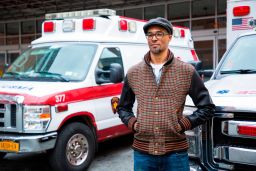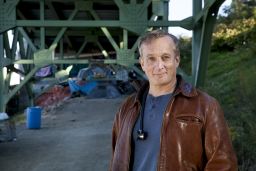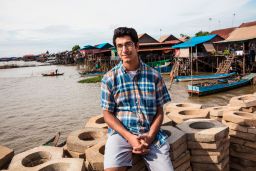As the coronavirus pandemic spreads, so are the efforts of people who bring much-needed aid – and inspiration – to those in need.
Some of them, previously recognized as CNN Heroes for their work to fix problems in their communities, now find themselves helping stem the tide of the virus.
Dr. Rob Gore, an emergency physician at Kings County Hospital Center and SUNY Downstate Medical Center in Brooklyn, is on the front lines of the crisis. A CNN Hero in 2018 for his violence prevention initiative, KAVI, right now he’s focused on his day job: providing medical care to his community.
“Covid-19, aka coronavirus, aka ‘Rona’ – what we call it in my neighborhood – it’s pretty scary,” Gore told CNN. “I’m not going to lie. It’s scary times.”
New York City is now considered the epicenter of the outbreak in the United States, with about 60% of the new cases in the country. Gov. Andrew Cuomo says the state is experiencing an “astronomical surge” in cases, which are now doubling every three days.

“I’ve worked in disaster zones in the past,” Gore said, noting his relief work in post-earthquake Haiti, South America and East Africa. “This feels like it’s a culmination of all of them.”
For Gore, this crisis isn’t a typical natural disaster, like Haiti’s 2010 earthquake, but he said he sees similarities in terms of lack of resources, access to care, and fear. Shortages of equipment such as ventilators, gloves and masks have been widely reported in New York City.
Tents are set up outside Gore’s hospital to assess and contain Covid-19 cases. And Gore is now living at an Airbnb to avoid infecting his family. For how long? He’s not sure.
“Right now with coronavirus, we don’t know how many patients are going to keep coming in,” he said. “We don’t know when it’s going to end.”
In Pittsburgh, Dr. Jim Withers is bringing care to people who are often overlooked. He was named a CNN Hero in 2015 for pioneering ” street medicine” – bringing health care to homeless people – and he serves thousands each year through Operation Safety Net, a program he started through his health system, Pittsburgh Mercy.
But the pandemic has given his work an even greater sense of urgency.
“People that we have out here on the streets … may be at higher risk in some ways for the Covid infection that’s coming,” said Withers, who spoke with CNN from the field, where he was helping screen people for the virus. “It’s very important … to not forget members of our community that may not be able to make it to standard testing areas.”

Withers’ group has been designated by the city’s mayor to lead virus management for the homeless. His team is giving out soap and jugs of water, and educating people about how they can protect themselves. They also have masks, tents and sleeping bags available for those who need to isolate but don’t want to go to the hospital.
In addition to helping contain the spread of the virus, Withers said he believes his work might help in the larger fight against Covid-19, increasing knowledge of how it’s spreading and who may be at the greatest risk.
Samir Lakhani is not a doctor, but his work is critically important to containing the virus. His nonprofit, Eco-Soap Bank, recycles soap from hotels and distributes it to those in need. In the past six years, the group says it has provided soap and education to more than 1.4 million people.
His mission is now one of the most vital ways to keep the virus from spreading.
“All of a sudden we have woken up to a new reality … where everyone is talking about handwashing with soap,” said Lakhani, a 2017 CNN Hero. “And it is our job to meet that demand and provide as much soap to people around the world as humanly possible, especially right now.”
Lakhani, 26, notes that there are “billions of people across the globe that either don’t have access or can’t even afford a single bar of soap.”

During the past two and a half months, his group has provided 375,000 bars of soap to people in 10 countries, ranging from rural communities in south Asia to people in slum communities in East and South Africa. His team has also started making surgical masks out of recycled hotel linens. But soap – and hygiene education – remain his primary focus.
“We are on track, should this virus still persist, to reach 2.5 million people by the end of this year with the soap that they need to keep themselves healthy,” Lakhani said.
While they’re consumed with battling the virus in their own ways, all of these CNN Heroes see reasons to be positive.
Gore recommends using this time of social distancing for self-reflection, and as an opportunity to find ways to help others.
“Think about who you are and what kind of problems you want to fix,” Gore said. “Contemplate these issues that you may have had in the back of your mind that you’ve always wanted to tackle. … Try to make the best of these times.”
Lakhani said he believes this crisis will ultimately show humanity at its best.
“We can adapt to almost any crisis that we face, and that is something that we should be proud of,” he said. “All of a sudden, I feel a sense of closeness to people. … It is as if the color of our skin and boundaries have just dissipated and dissolved in front of our eyes.”
Withers said he, too, feels the lessons we’re learning now can help us build a better future.
“We’re all in this together. These are our brothers and sisters out here,” he said. “Hopefully, the lessons that we learn here of being together and taking care of each other will last far beyond this Covid epidemic.”


